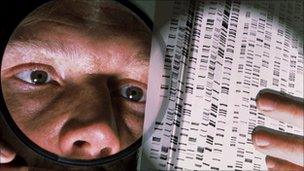Courts ‘will reject test secrecy’
- Published

The Forensic Science Service is to be wound down gradually
There is a serious mismatch between the government's aim to commercialise forensic science and the requirement of courts for openness, according to a top forensic expert.
Peter Gill told the BBC that UK courts would not accept forensic tests whose details are kept secret due to commercial confidentiality issues.
He said this would prevent proper scrutiny of forensic techniques.
Professor Gill also warned the National DNA Database needed upgrades urgently.
And that without them, the UK resource would fall behind comparable systems used in other countries.
Late last year, the government said the Forensic Science Service would be wound up, adding that as many of its operations as possible were to be transferred or sold off.
The Home Office, the Association of Chief Police Officers (ACPO) and the National Policing Improvement Agency (NPIA) agreed to set up a working group to ensure a "smooth transition" as the Forensic Science Service (FSS) was wound down.
Test oversight
Now based at the University of Oslo, Norway, Peter Gill helped develop the DNA fingerprinting technique used widely by crime scene investigators - along with Sir Alec Jeffreys at the University of Leicester.
"Courts will not accept secret tests that have not been subject to rigorous peer review and challenge," Professor Gill has said in his submission to the House of Commons science committee's inquiry, external into the closure of the Forensic Science Service (FSS).

A new genetic marker system has been recommended for DNA databases
"The public will not accept sub-standard tests being used in any laboratory."
He added: "An exploratory framework is needed to discover whether laboratories are providing sub-standard results."
Professor Gill cited one recent court case where the judge criticised the FSS for using an internally developed "commercial in confidence" database.
"This case... demonstrates that a serious mismatch exists between the government's aspiration to privatise forensic science, versus the court requirement for openness, disclosure, and scientific peer review," said Professor Gill.
"It is easily demonstrated, therefore, that the framework to utilise forensic science in the UK, where the market is entirely privatised, is already fatally flawed."
'Urgent upgrades'
The FSS analyses evidence from crime scenes in England and Wales, but has been losing about £2m a month.
It employed 1,600 people and handled more than 120,000 cases each year.
"The NPIA, ACPO and Home Office will continue to work with the Forensic Science Service to ensure that transition arrangements are in place to manage the wind-down of their forensic services," said a joint statement from ACPO and the NPIA.
The government wants private enterprise, which currently makes up 40% of the market, to fill the gap left behind by the FSS.
However, many experts are sceptical that this can work and point out that the UK's private forensics sector is shrinking.
There are also concerns that an over-emphasis on profits could threaten the quality of science.
At the time of the government's announcement, Crime Reduction Minister James Brokenshire said private sector competition for police contracts was enabling forces to achieve greater efficiency.
He said that the Forensic Science Regulator should ensure that quality standards are maintained.
Professor Gill said the UK's National DNA Database was already out of date, and in urgent need of upgrades to bring it in line with standards rapidly being adopted elsewhere in the European Union.
He said there was no timescale or coherent strategy for the adoption of these standards in the UK.
"Being locked in the past, the inevitable consequence is that casework is carried out with less efficiency than would otherwise be the case elsewhere in the EU. Cases will effectively be 'lost' - i.e. they will fail to provide probative results in laboratories not equipped with the latest technology," said Peter Gill.
Paul.Rincon-INTERNET@bbc.co.uk
- Published19 January 2011
- Published28 December 2010
- Published14 December 2010